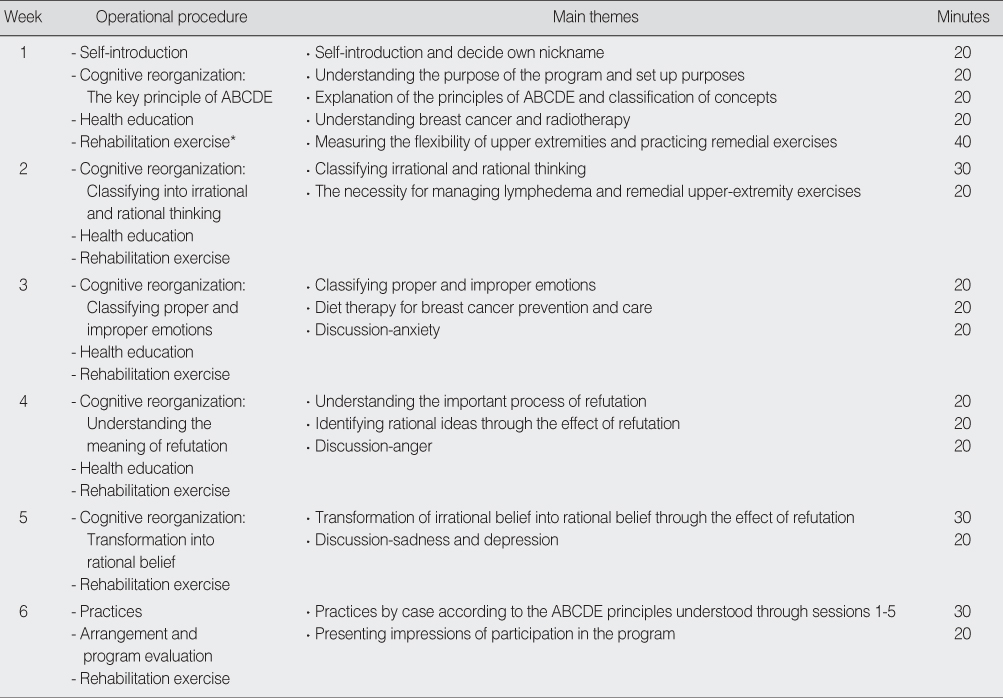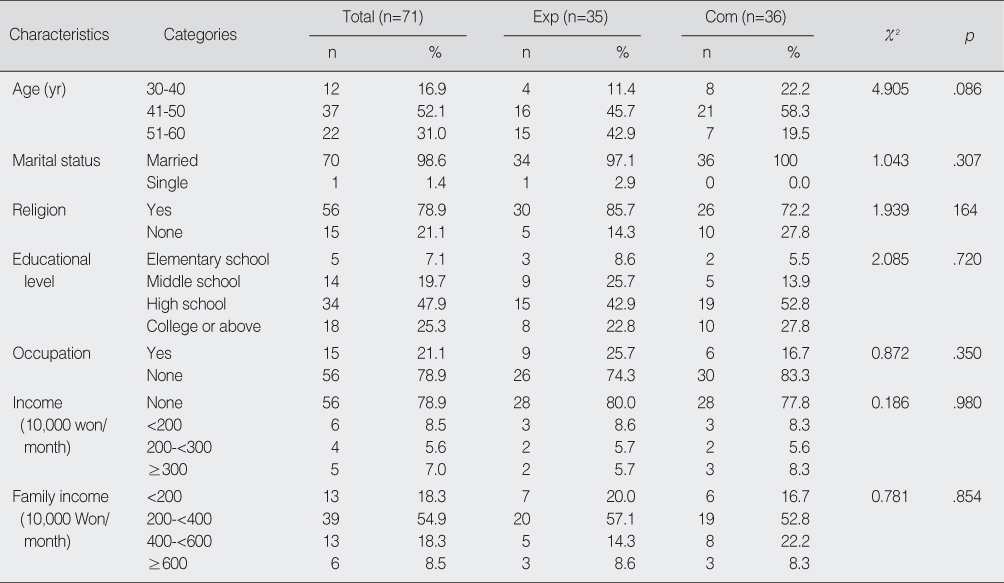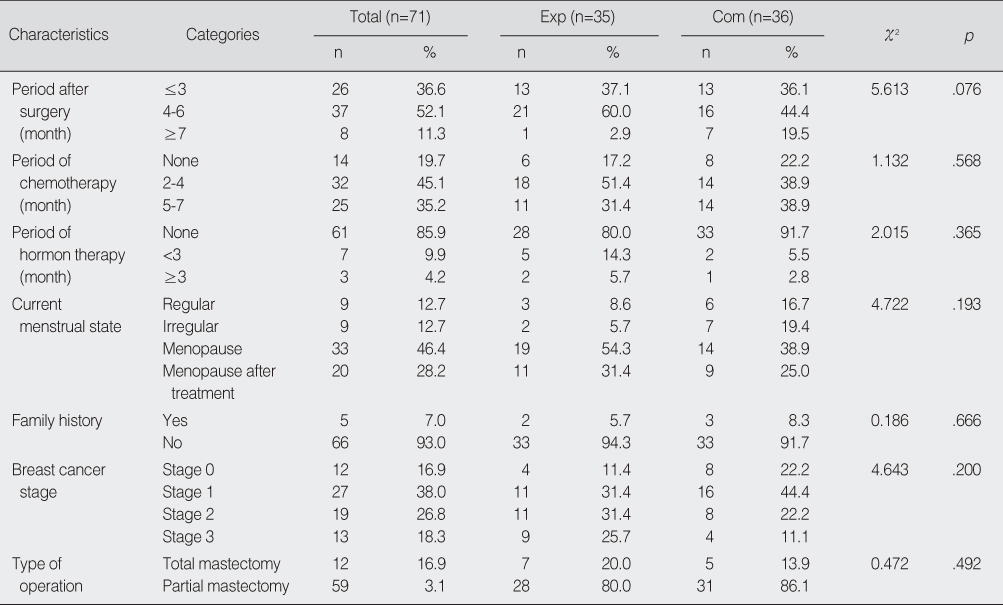Articles
- Page Path
- HOME > J Korean Acad Nurs > Volume 39(2); 2009 > Article
-
Original Article
- Effects of a Cognitive-Behavioral Nursing Intervention on Anxiety and Depression in Women with Breast Cancer undergoing Radiotherapy
- Myung-Sook Yoo, Haejung Lee, Jung-A Yoon
-
Journal of Korean Academy of Nursing 2009;39(2):157-165.
DOI: https://doi.org/10.4040/jkan.2009.39.2.157
Published online: April 28, 2009
1Nurse, Pusan National University Hospital, Busan, Korea.
2Associate Professor, College of Nursing, Pusan National University, Yangsan, Korea.
- Address reprint requests to: Lee, Haejung. College of Nursing, Pusan National University, Beomeo-ri, Mulgeum-eup, Yangsan 626-770, Korea. Tel: 82-51-510-8344, Fax: 82-51-510-8308, haejung@pusan.ac.kr
Copyright © 2009 Korean Society of Nursing Science
Abstract
-
Purpose
- The purpose of this study was to analyze the effects of a cognitive-behavioral nursing intervention on anxiety and depression of patients with breast cancer undergoing radiotherapy.
-
Methods
- A nonequivalent control group design was used for the study. The research participants were patients with breast cancer (N=71; experimental group=35, comparison group=36) who received radiotherapy at P university hospital. The experimental group received a 6-week cognitive-behavioral nursing intervention (2 hr/week), which included nursing counseling, education about treatment choices for breast cancer and possible side effects and management strategies during radiotherapy, and rehabilitation exercise.
-
Results
- Following the intervention, the experimental group showed significantly lower levels of anxiety (Experimental group=34.60±6.35, Comparison group=44.63±9.93, t=3.552, p<.001) and depression (Experimental group=10.20±6.61, Comparison group=17.81±10.85, t=3.542, p<.001) than the comparison group.
-
Conclusion
- The findings from this study showed that cognitive-behavioral counseling applied by nurses is very effective to reduce anxiety and depression among patients with breast cancer. Therefore, providing nursing counseling to broader spectrum of patients with cancer should be considered. Further research would warrant future clinical application of nursing counseling.
- 1. Chae YR. Effect of treadmill walking exercise on quality of life in patients with breast cancer. Daebul University Bulletin. 2002;8:193–206.
- 2. Chung BY. Adjustment process of women with breast cancer. 1991;Seoul, Yonsei University. Unpublished doctoral dissertation.
- 3. Ellis A. Reason and emotion in psychotherapy. 1962;Secaucus, NJ, Citadel.
- 4. Hahn HM, Yum TH, Shin YW, Dim KH, Yoon KJ, Chung KJ. A standardization study of Beck Depression Inventory in Korea. Journal of The Korean Neuropsychiatric Association. 1986;25:487–500.
- 5. Kim HJ. Effects of foot-reflex-massage on anxiety and fatigue of cancer patients undergoing radiation therapy. 2004;Busan, Kosin University. Unpublished master's thesis.
- 6. Kim JM. The effect of hand massage on the anxiety of the hysterectomy patients in immediately prior to surgery. Journal of Korean Academy of Nursing. 2000;30:476–487.ArticlePDF
- 7. Kim JN. The efficacy of an integrated group psychotherapy for breast cancer patients on the quality of life and immune function. The Korean Journal of Clinical Psychology. 2005;25:639–655.
- 8. Kim JT, Shin DK. A study based on the standardization of the STAI for Korea. The New Medical Journal. 1978;21:69–75.
- 9. Kim KB. The effect of auricular acupressure therapy on anxiety of cancer patient. Journal of Korean Academy of Nursing. 2002;32:888–896.
- 10. Kim MJ. A survey on changes in quality of life of patients who received radiation therapy after surgery for breast cancer. Journal of Korean Academy of Nursing. 1994;24:652–665.
- 11. Kim SH. Effects of hand massage on the anxiety, sleeping satisfaction and pain of hysterectomy patients. 2003;Seoul, Ewha Womans University. Unpublished master's thesis.
- 12. Kim TH. Effect of foot-reflex-massage on preoperative anxiety, depression and sleep satisfaction of the patients with breast tumor. 2004;Daejeon, Chungnam National University. Unpublished master's thesis.
- 13. Kim YS. Effect of the information education of I131 treatment on the anxiety and immune response of thyroid cancer patients. 2006;Busan, Pusan National University. Unpublished doctoral dissertation.
- 14. Kim YW, Yang CK, Choe BM, Hahn HM. A study of depression in cancer patients on radiotherapy. Journal of Korean Neuropsychiatric Association. 1996;35:260–267.
- 15. Koh KB, Kim ST. Coping strategy of cancer patients. Journal of Korean Neuropsychiatric Association. 1988;27:140–148.
- 16. Lazarus RS, Folkman S. Stress, appraisal and coping. 1984;New York, NY, Springer Publish Company.
- 17. Lee CY, Oh DW. Level of anxiety and depression of the hospitalized cancer patients. Journal of Korean Neuropsychiatric Association. 1990;29:178–188.
- 18. Lee JH. Counseling psychology. 2006;Seoul, Pakyoungsa.
- 19. Lee WM. A study of the depression and the quality of life in patients with breast cancer. 2006;Iksan, Wonkwang University. Unpublished master's thesis.
- 20. Korean cancer statistics. National Cancer Center. 2008;11 13 Retrieved December 1, 2008. from http://www.cancer.go.kr/cms/statics/incidence/index.html.
- 21. Oberst MT, Hughes SH, Chang AS, McCubbin MA. Self-care burden, stress appraisal, and mood among persons receiving radiotherapy. Cancer Nursing. 1991;14:71–78.PubMed
- 22. Oh EH. Effect of guided imagery program on patients depression and anxiety receiving cancer chemotherapy. 2003;Daegu, Keimyung University. Unpublished master's thesis.
- 23. Park KA. Rational emotive behavior therapy. 1997;Seoul, Hakjisa.
- 24. Peck A, Boland J. Emotional reactions to radiation treatment. Cancer. 1977;40:180–184.PubMed
- 25. Radloff LS. The CES-D scale: A self-report depression scale for research in the general population. Applied Psychological Measurement. 1977;1:385–401.
- 26. Rehse B, Pukrop R. Effects of psychosocial interventions on quality of life in adult cancer patients: Meta-analysis of 37 published controlled outcome studies. Patient Education and Counseling. 2003;50:179–186.Article
- 27. Spielberger CD. Anxiety: Current trends in theory and research. 1972;New York, NY, Academic Press.
- 28. Yang YH. Trajectory of fatigue, quality of life and physical symptoms in cancer patients receiving radiotherapy. Journal of Korean Academy of Nursing. 2003;33:562–569.PubMed
- 29. Yeo KE, Chung YS. Cognitive-behavior modification: An integrative approach. 1995;Seoul, Yangseowon.
REFERENCES
Figure & Data
REFERENCES
Citations

- Effects of specialized nursing intervention based on quantitative assessment strategy on psychological state and quality of life of patients with senile dementia
Angel Yong, Ying Zhao, Hai’e Xu, Qian Liu, Chuanying Huang
Acta Neurologica Belgica.2023; 123(6): 2213. CrossRef - Effects of Psychosocial Interventions for Patients with Breast Cancer: A Meta-analysis
Kyu-Sic Hwang, Kuy-Haeng Lee, Chan-Mo Yang, Hye-Jin Lee, Sang-Yeol Lee
Clinical Psychopharmacology and Neuroscience.2023; 21(1): 118. CrossRef - Nursing strategies to support psychological adaptation in adult cancer patients: a scoping review
Tiago André dos Santos Martins Peixoto, Nuno Miguel dos Santos Martins Peixoto, Cândida Assunção Santos Pinto, Célia Samarina Vilaça de Brito Santos
Revista da Escola de Enfermagem da USP.2021;[Epub] CrossRef - Function of a Psychological Nursing Intervention on Depression, Anxiety, and Quality of Life in Older Adult Patients With Osteoporotic Fracture
Liying Huang, Caiting Zhang, Jiahui Xu, Wei Wang, Miao Yu, Fusong Jiang, Liang Yan, Fanghui Dong
Worldviews on Evidence-Based Nursing.2021; 18(4): 290. CrossRef - Factors related to CPR performance ability of dental hygenists working in dental hospitals
Eun-Young Choi, Choong-Ho Choi
Journal of Korean Academy of Oral Health.2020; 44(4): 228. CrossRef - Non-pharmacological therapies for depressive symptoms in breast cancer patients: Systematic review and meta-analysis of randomized clinical trials
Liliana Coutiño-Escamilla, Maricela Piña-Pozas, Aurelio Tobías Garces, Brenda Gamboa-Loira, Lizbeth López-Carrillo
The Breast.2019; 44: 135. CrossRef - A psychological intervention programme for patients with breast cancer under chemotherapy and at a high risk of depression: A randomised clinical trial
Yeon Hee Kim, Kyung Sook Choi, Kihye Han, Hae Won Kim
Journal of Clinical Nursing.2018; 27(3-4): 572. CrossRef - A Study on Genetic Knowledge and Anxiety in Patients with Breast Cancer
Hyeyeon Seo, Myungsun Yi
Asian Oncology Nursing.2017; 17(3): 151. CrossRef - Health Promoting Behavior and Influencing Factors in Iranian Breast Cancer Survivors
Fatemeh Moghaddam Tabrizi
Asian Pacific Journal of Cancer Prevention.2015; 16(5): 1729. CrossRef - An Integrative Review of Depression Related to Intervention Studies for Women in Korea Journals
Eun Young Choi, Eun Hee Lee, Hye Jin Hyun, Mi Kyeong Byeon
Korean Journal of Women Health Nursing.2015; 21(4): 284. CrossRef - Psychosocial outcomes of e‐feedback of radiotherapy for breast cancer patients: a randomized controlled trial
Mervi Siekkinen, Seppo Pyrhönen, Anne Ryhänen, Tero Vahlberg, Helena Leino‐Kilpi
Psycho-Oncology.2015; 24(5): 515. CrossRef - A clinical randomized controlled trial of music therapy and progressive muscle relaxation training in female breast cancer patients after radical mastectomy: Results on depression, anxiety and length of hospital stay
Kaina Zhou, Xiaomei Li, Jin Li, Miao Liu, Shaonong Dang, Duolao Wang, Xia Xin
European Journal of Oncology Nursing.2015; 19(1): 54. CrossRef - Avaliação da intervenção cognitivo-comportamental em gestão do stress em pacientes com fadiga oncológica, em radioterapia
Cláudia Ng Deep, Isabel Leal, Ivone Patrão
Saúde e Sociedade.2014; 23(1): 293. CrossRef - Factors Affecting Sexual Function of Breast Cancer Women After Receiving Cancer Treatment
Hye Sun Byun, Bok Yae Chung, Gyung Duck Kim, Kyung Hae Kim, Eun Hee Choi
Asian Oncology Nursing.2013; 13(2): 85. CrossRef - Factors influencing health-promoting behaviors in Korean breast cancer survivors
Myungsun Yi, Jeongeun Kim
European Journal of Oncology Nursing.2013; 17(2): 138. CrossRef - Effects of a Simulation-based Educational Program for Gastroendoscopic Surgery Patients
Su Young Kwon, Jia Lee
Korean Journal of Adult Nursing.2013; 25(5): 494. CrossRef - Impacts of Fatigue, Pain, Anxiety, and Depression on the Quality of Life in Patients with Breast Cancer
Hye Sun Byun, Gyung Duck Kim
Asian Oncology Nursing.2012; 12(1): 27. CrossRef - Effects of a Nurse-Led Cognitive-Behavior Therapy on Fatigue and Quality of Life of Patients With Breast Cancer Undergoing Radiotherapy
Haejung Lee, Yeonjung Lim, Myung-Sook Yoo, Yongsuk Kim
Cancer Nursing.2011; 34(6): E22. CrossRef

Figure 1
Contents and Organization of Cognitive Behavior-Nursing Counseling
*Rehabilitation exercise consists of progressive relaxation therapy (10 min) and upper body flexibility exercise (30 min).
General Characteristics of the Participants
Exp=experimental group; Com=comparison group.
Disease related Characteristics of the Participants
Exp=experimental group; Com=comparison group.
Effects of Cognitive-Behavioral Nursing Counseling on Study Variables (N=71)
Exp=experimental group; Com=comparison group; Pre=pretest; Post=posttest.
*Rehabilitation exercise consists of progressive relaxation therapy (10 min) and upper body flexibility exercise (30 min).
Exp=experimental group; Com=comparison group.
Exp=experimental group; Com=comparison group.
Exp=experimental group; Com=comparison group; Pre=pretest; Post=posttest.
 KSNS
KSNS
 E-SUBMISSION
E-SUBMISSION





 Cite
Cite

